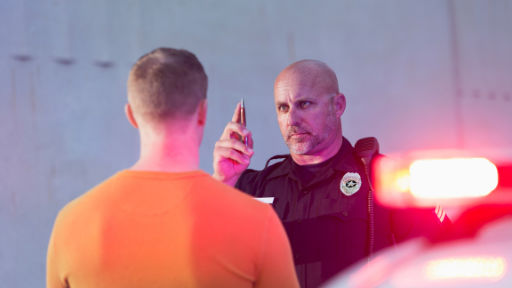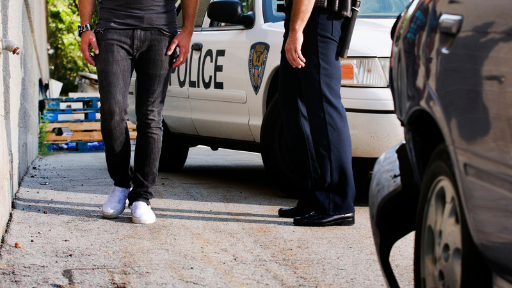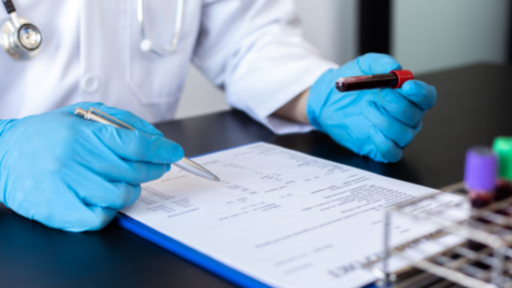A field sobriety test is an informal battery of tests officers often administer when pulling a driver over on suspicion of driving under the influence.
Typically, this entails a sequence of common-sense physical coordination exercises—for example, walking in a straight line heel-to-toe for nine steps, then turning around and repeating the process. It is crucial for drivers to understand that results from this sort of testing are not (as widely believed) conclusive evidence of intoxication—and that further testing may be administered in order to determine BAC levels and confirm or rule out suspects.
It’s important for drivers to understand what a field sobriety test is, and how it works since it’s often the first line of testing.
What is a Field Sobriety Test
According to the National Highway Traffic Safety Administration, there are three field sobriety tests (SFSTs) used by police officers in the United States to determine whether a driver is intoxicated. A driver suspected of being impaired by alcohol may be asked to take a breath test or chemical test to confirm his or her blood-alcohol content. There are several types of field sobriety tests.
Horizontal Gaze Nystagmus

Horizontal gaze nystagmus (HGN) is an involuntary eye movement characterized by smooth, jerking movements of the eyeball. It occurs when the eyes rotate at high peripheral angles. HGN is more exaggerated in people who have consumed alcohol.
Turning the HGN test, the officer will ask the driver to follow a moving object, such as a pen or flashlight, slowly from side to side. The officer looks to determine:
- If jerking is distinct when the eye is at maximum deviation
- If the angle of jerking onset is within 45 degrees
- If the eye cannot follow the object smoothly
If four or more clues appear between the two eyes, the driver is likely to have a blood-alcohol content (BAC) of 0.10 or greater.
The National Highway Traffic Safety Administration (NHTSA) research shows this test to be accurate in 77% of test subjects.
Walk-And-Turn Test
For the walk-and-turn test, the driver must take nine steps heel-to-toe along a straight line, turn on one foot, and return nine steps in the opposite direction.
The officer looks for seven indicators of impairment during the test. A subject may be impaired if they:
- Begin before the instructions are finished
- Cannot keep balance while listening to the instructions
- Does not touch heel-to-toe
- Loses balance while turning
- Stops while walking to regain balance
- Takes an incorrect number of steps
- Uses arms to balance
If the driver exhibits two or more of the above indicators during the test, there is a 68% likelihood of a BAC level of 0.10 or higher, according to the NHTSA.
One-Leg Stand Test

When the one-leg stand test is administered, the officer asks the driver to stand on one leg and count from 1,001 until the officer tells him or her to put their foot down.
The officer examines these four indicators during the next 30 seconds:
- Hopping to maintain balance
- Putting the foot down
- Swaying while balancing
- Using arms to balance
The NHSTA reports that a driver with two or more of the above indicators has a 65% chance of having a BAC of 0.10 or greater.
Problems With These Test Results
Field sobriety tests are not considered wholly accurate, due in part to the officer’s own bias. The officer administering the test will interpret a driver’s words and actions according to his perception. Some courts do not accept this as evidence of driving under the influence.
You Can Refuse to Field Sobriety Test in Virginia
A police officer may ask a driver to step out of the vehicle and perform any one of the common field sobriety tests before making an arrest. At this point, it is acceptable for you under Virginia law to refuse the tests. If the case proceeds to court, the police cannot utilize this refusal as evidence. Following a refusal, the police officer needs to determine whether arresting the driver is appropriate based on other factors, such as whether the driver was swerving wildly on the road. You Can’t Refuse a Chemical Test in Virginia

When other pieces of information are available, a police officer can arrest a driver on suspicion of a DUI. In this situation, the officer will take the driver to the station and will ask him to participate in a chemical test to determine blood alcohol levels. At this point, there are consequences if the person refuses. Refusing a single time can result in license suspension for up to one year. Any subsequent refusals will carry much harsher penalties.
This is due to Virginia’s “implied consent” laws. These laws state that once a driver has been arrested, then he or she automatically consents to chemical tests.
A Virginia DUI Attorney Can Help If You’re Arrested
If you’re facing DUI charges, don’t leave your case to chance. It’s too important for you not to have the right team of professionals on your side. The best thing you can do is contact a Virginia experienced DUI attorney who can thoroughly review your case and put their knowledge and experience to work for you. Whether your arrest was the result of a traffic stop or after failing a field sobriety test or chemical breath analysis, they are there to assist you in getting your charges dismissed while working towards clearing your name.
Give us a call right now at 571-556-8710 for a FREE consultation. Or visit our website: https://rightpathlaw.com/

Pierre Prialé
Founder and CEO
Over the course of his career, Prialé has handled approximately 2,000 criminal defense and traffic cases, including DUI, reckless driving, weapons charges, and personal injury cases. His dedication to helping clients in difficult and desperate situations has earned him a reputation for being a committed and knowledgeable attorney.
Author's Bio